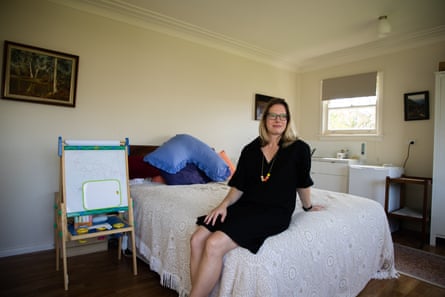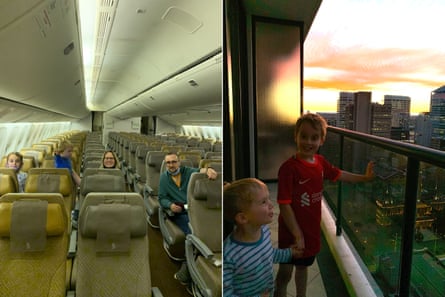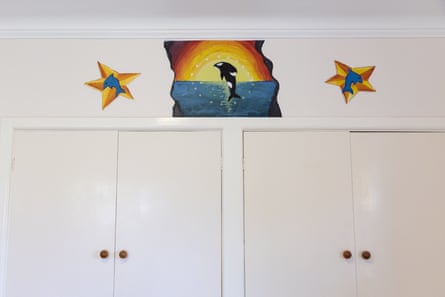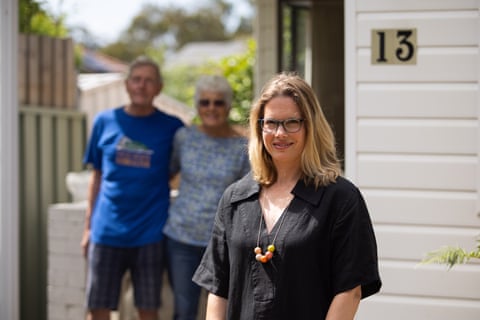It will be like a real-life Frayed, I joked to friends. We’ll appear, slightly disoriented, in Sydney’s southern, faded beach-side suburbs, a place I thought I’d long since left behind. I’ll even wear the dresses.
After 18 years of living in the UK, returning to Australia with a small family in tow was always going to be an adventure/insane, especially in the middle of a pandemic. But my head was only filled with the good stuff: the smell of eucalyptus, glimmering green ocean pools, the warm embrace of family and friends, and sweet non-Covid freedom.
The reality, as always, was something else. Because moving home meant moving back in – at least temporarily – with my parents, and to the house I grew up in.
“It won’t be for long,” I assured my husband, who looked a bit pale every time we went over the plans involving his in-laws. “It might even be nice? Anyway, we’ll find our own place really quickly.”
But I was wrong.

Naively, I thought the heart-stopping lead up to escaping plague island would be the worst of it. Negotiating what to do if the sudden cut to arrivals caps meant we got bumped off our flight at the last minute, job interviews at ungodly hours in a half-packed up house, keeping the kids isolated for the last week as Delta tore through our village, saying goodbye without actually going inside anyone’s house – surely these were the hardest moments?
Quarantine, we foolishly reasoned, would be a breeze in comparison. After arriving on a ridiculously empty plane (12 passengers) and being ushered into our confines, it was clear that once again, we were mistaken. You don’t truly know the meaning of panic until you spend two weeks in an apartment with a balcony 30 floors up and a fearless, outdoor-loving three-year-old. On our penultimate day in the high-rise prison and after four Covid tests, a doctor, soldier, policeman and a nurse knocked on the door. It sounded like a bad joke.

“Well you’ve tested negative,” the doctor said, as all four of us lined up in front of them. “But now we are just going to … um, look at you.” We stared back – pasty white, full of two weeks’ worth of quarantine food and stale air. “Yep, you look healthy,” he said. The truth, though, is that we looked like shit.
Our day of release into the Australian wilds came. An hour after scrambling into my dad’s car we were at the beach, diving into the cool, clear water as Australians in winter coats looked on in horror.
And suddenly we were back. Back in my old bedroom, an achingly bad Smashing Pumpkins inspired mural staring at me from above the cupboard doors (what is it that compels parents to only preserve the embarrassing things?). Back around the dining table I spent my childhood at, squabbling with siblings. Back at my old primary school, so that I could enrol my son, while wondering what kind of life choices we were making. Back in my old neighbourhood, despite, many many moons ago, gleefully joining a FB page “I left the shire”. Back in a country where Covid, unlike in the disease-ridden nation we’d just left, seemed like a relatively new phenomenon. Our conversations on the pandemic were thrust 18 months in the past. “Well you don’t understand, we haven’t had Covid here, until now!” “But you don’t understand how many lockdowns we’ve lived through!”

Perhaps a bit more unexpectedly, other facets of Australian life made us feel we’d flown into the past. “Is it electric?” My three -year-old would always ask when he saw other people drive to the house (but obviously, not enter).
Eight years since being wed, I found myself reunited with my maiden name when authorities refused to recognise my British marriage certificate. “But it’s the same head of state!” I wailed at various uninterested call centres. Waiting days for bank transfers, not being able to buy booze in the supermarket, a government that won’t address the realities of climate change (guys, even Boris Johnson talks about it) – the time warp was everywhere.
Some things had changed though – mainly the horrifically bloated house prices and impenetrable rental market, meaning our stay at casa parental appeared infinite.
In the first few days, some rules were laid down. Mainly for the kids … I think. There was the hot water limit, no sand in the washing machine, and a special area the two boys were forbidden to enter, where my dad kept a prized clarinet. It didn’t take us long to break them. The next day, I spied my youngest, crouching silently in the no-go zone, concentrating, his sweaty hands fingering the keys.

There was also work to negotiate in this topsy-turvy world. I walked into my first day at the Guardian, not by prancing into a bustling newsroom, but by stepping into the fibro granny flat, where my nan once lived, to sit at a rickety camping table upon which I tried to steady my laptop and monitor.
Oddly, my dreams of our new life had not included my mother bursting into work meetings holding a kilo of raw chicken and launching into a raft of complicated cooking options, or my dad rushing past to use the spare fridge as I attempted to look vaguely professional on a Zoom call.
Salvation did come though. Three months after setting foot on Sydney soil/sand, we escaped to our own place. A day after moving out we nipped back for some leftover bits.
“I miss you!” my mum exclaimed as I entered the hallway. I looked at her, quizzically. “Are you sure?” I ask, while scanning the house, which now looks clean and calm. No screaming children flying through the kitchen or pouring all the bath water onto the floor or eating all the Tim Tams.
“Yes” she says, with meaning. And in a moment, I remember why, despite everything, coming back was also the best.
